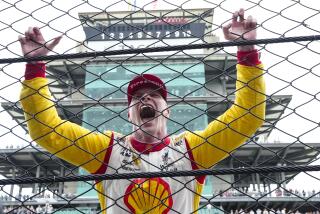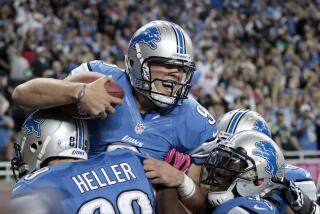Prost: He’s Toast of Formula One Drivers : Tiny Frenchman Is the Most Successful of His Era and Possibly of All Time
- Share via
DETROIT — Around the racing circuits of the world, where the Formula One cars perform, Alain Prost is known as The Professor because of his cerebral approach to the art of going fast--safely.
To Jackie Stewart, whose most cherished record of 27 Grand Prix wins was shattered by Prost, The Professor is quite simply, “the best driver in the world today.”
To the casual observer, seeing the jockey-sized Prost wandering around the lobby of the Westin hotel in turquoise slacks, T-shirt and sock-less jogging shoes, a Rolex watch on his wrist, his thick, bushy hair lapping on his shoulders, framing a half-shaven 5 o’clock-shadow look, he seems more like a rock musician.
When he straps himself into his red-and-white McLaren racing car, however, and the crew switches on the turbocharged Honda engine, the little Frenchman is the most successful Grand Prix driver of his era. And with just a little luck, he could be considered the most successful of all time.
Ron Dennis, managing director of the Marlboro-McLaren team for whom Prost will drive in today’s Detroit Grand Prix, claims he already is.
“I would say that Alain is probably the best racing driver in the history of motorsport,” Dennis declared.
Prost, 33, will start from the second row in the seventh annual race through the streets of downtown Detroit. His McLaren teammate, Ayrton Senna of Brazil, will start on the pole--the sixth consecutive race in which the Brazilian has been fast qualifier.
Senna qualified at 89.458 m.p.h., followed by the Ferraris of Gerhard Berger and Michele Alboreto, and then Prost.
Prost’s three wins in five races this season--in Brazil, Monaco and Mexico--give him a career 31. Among drivers still racing, world champion Nelson Piquet of Brazil is next with 20.
Prost has won two world championships, in 1985 and 1986, and could easily be on his way to five, which would put him on a pedestal with the legendary Juan Manuel Fangio of Argentina. He missed the 1983 championship by two points when he was driving for the Renault team, and the following year missed by a half-point to his McLaren teammate, Niki Lauda. On both occasions, Prost won more races than the champion.
This year, going into Detroit Grand Prix VII, Prost has 39 points to 24 for Senna. No one else is in contention.
“Winning the championship is most important to me,” Prost said during a lull in practice Saturday. “That and adding to the 31 (wins) is my motivation.
“I hear other drivers say they race because they love to race. Not me. I love to race to win. Winning is everything to me, an obsession, ever since I drove in my first kart race.”
Prost, like so many champion road race drivers, began his career in a kart. He was a teen-ager on a holiday outing with his family when he first rented a go-kart to speed around a parking lot course.
“I was hooked immediately with the excitement,” he recalled. “I bought my first kart for 700 francs, raced a year, and from then on I have been under contract to race.”
When he was 20, Prost won the French and European kart championships and was rewarded with tuition to the driving school of his choice.
Renault, the French national team, signed him for the Formula Three series and he responded by winning the European championship in 1979. That caught the attention of Formula One teams, always on the lookout for a young driver to groom as the No. 2 man on their team.
Prost selected McLaren, where John Watson, winner of the final Long Beach Grand Prix, was the No. 1 driver. Before the season ended, however, he got in a dispute with McLaren boss Teddy Meyer and quit to join Renault.
“I am still unhappy when I think about that,” Prost said. “They put out a story that I broke my contract to sign for more money with Renault. That is not true. I became unhappy when the car was not running right and the team kept telling the media that it was driver error.”
The problem came to a head in the United States GP at Watkins Glen, N. Y., when the suspension broke and a McLaren spokesman said it was Prost’s fault because he tried to go too fast on cold tires.
“I had already gone eight laps on the tires before the suspension broke,” Prost said, his dark eyes flashing with emotion as he recalled the situation.
With Renault in 1981, Prost responded by winning his first Grand Prix, in his native France, in front of the Renault brass.
In three years with the French team, Prost won nine races and missed by only two points of overtaking Piquet for the championship in 1983. Going into the final race, in South Africa, Prost had a two-point lead but lost the race and the championship when mechanical trouble put him out.
Despite his well chronicled difficulties with McLaren a few years earlier, Prost returned to the team in 1984.
“Some people were surprised, but really, the McLaren team was entirely new,” Prost said. “It was a completely different group.”
Dennis, who put a new team together in 1981, signed young Prost to drive with two-time world champion Lauda in new turbocharged Porsche-powered McLarens. He won seven races, two more than Lauda, and lost the championship by half a point.
The next year, Prost won his first championship and then repeated to become the first back-to-back champion since Jack Brabham of Australia in 1959 and 1960.
Prost sees a parallel in his relationship to Lauda in 1984 to this year when his teammate is the feisty Senna, at 28 five years his junior.
“Niki was the old master when I joined the team and I was the young guy,” Prost said. “But we worked together very quickly. I was very eager to learn and Lauda helped me a lot. I think I can help Ayrton and that we can have the same type of relationship that Niki and I had.
“We are not close, why should we be, but we are friendly. Everything is very open between us.”
Senna, who joined McLaren this year after three years with Lotus, has won all six poles and two races. Senna has also won the last two races here in Detroit.
“We have had no difficulties with having two such talented drivers,” Dennis said. “From the McLaren standpoint, it is ideal. We have twice as many chances to win. If a contest should develop between the two of them, we do not believe that this will manifest itself in any problems.
“We have demonstrated in the past that we can give both of our drivers equal equipment. As was the case when we were running Lauda and Prost together in 1984 and 1985, it is usually fate which steps in and decides who wins the championship.
“What we are, though, is a team. It is my position to combine two very strong personalities toward one objective--to have a McLaren car win the race, and win the championship.”
Dennis is also acutely aware that Prost may retire one of these days and he wants Senna as his heir apparent.
Prost admits that the thought of retirement has crossed his mind but that he puts it on hold as long as he is winning.
“I have won all that I ever hoped to achieve in Formula One, but there is some motivation in adding to them--more championships and more wins,” Prost said. “I know that if I were driving for a team that was struggling and we had little or no chance of winning, I would retire. Like I said, I do not race because I love racing, I race to win.
“If I leave Formula One, though, I do not think I will leave racing entirely. I would like to do some salon car racing, maybe some endurance racing in touring cars where it is not so intense. I would like to drive with my good friend, Jacques Laffite, in some races like that.”
Laffite retired from Formula One two years ago after a serious accident at the start of the British Grand Prix. He and Prost are partners in a golf course near the Dijon circuit in France.
Prost has made Switzerland his home since 1984. He lives in Yens with his wife Anne-Marie and their son, Nicholas, 6, where his fetishes are golfing and keeping fit.
“I am careful of my conditioning,” he said as he nibbled on some grapes and nuts. “I follow a close diet planned for me by (Austrian sports trainer) Willi Dungl, who I met through Lauda. And I follow a close exercising program between races. Keeping in good physical condition is very important to a driver.”
Few things cause the usually smiling Frenchman to frown, but one is mention of the Detroit Grand Prix course, a 2.5-mile circuit with 20 turns on downtown streets near the Detroit River.
“When I first came here in 1982, I couldn’t believe it could be so bad but I thought it was to be improved,” Prost said. “Now I am here in 1988 and it was just as bad. Maybe worse. It is absolutely the worst course we drive all year.
“It is not good for us, it is dangerous with all bumps and the blind corners, and it is not good for the spectators because they can’t see us display our techniques of driving. This track does not allow us to perform the way we enjoy performing.
“I have talked so many times about how bad it is, I hate to talk about it anymore, but I don’t like it. I hear that they may move the circuit next year (to nearby Belle Isle, in the Detroit river) and it doesn’t matter where they go, it has to be better.”
Despite his distaste for the course, Prost has finished third in the last two races here.
“Just because I have a dislike for a track does not mean that it affects my motivation,” Prost said. “I will still be trying to win, but it will be difficult here where there is no place to pass. It will be especially difficult with Ayrton (Senna) starting in front.”
Isn’t there anything about Detroit that Prost likes?
“I love having my hotel in the middle of the circuit. That way, between the warm-up tomorrow and the race, I can go to my room and relax while I watch the golfers in the U.S. Open. That, I do like.”
More to Read
Go beyond the scoreboard
Get the latest on L.A.'s teams in the daily Sports Report newsletter.
You may occasionally receive promotional content from the Los Angeles Times.










